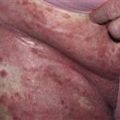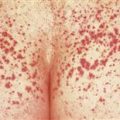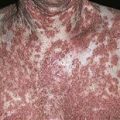134
Cutaneous metastasis
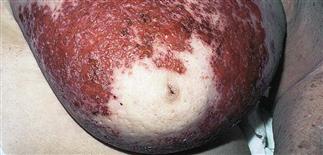
Cutaneous metastases occur in 0.7–9.0% of all cancer patients. Cutaneous metastasis occurs in 24% of all breast cancer patients.
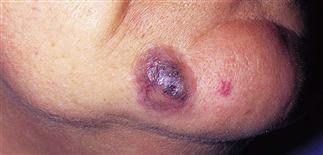
About 75% of skin metastases in male patients occur on the head, neck, and anterior chest and abdomen.
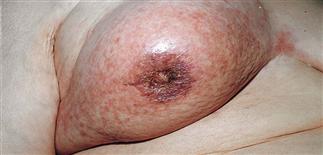
In female patients, about 75% of skin metastases occur on the anterior chest or abdomen.
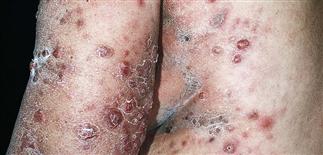
Most cutaneous metastases do not have a distinct clinical appearance. Most present as a cluster of discrete, firm, painless nodules on the trunk or extremity.
DESCRIPTION
Occurs in 0.7% of cancer patients. Detection alters disease staging, therapy. Cutaneous metastases presenting as first sign of malignancy occur most frequently with lung, kidney, ovarian tumors. • Women: most common cancers causing cutaneous metastasis are breast (70%), colon (9%), melanoma (5%), lung (4%). • Men: most common cutaneous metastatic cancers are lung (24%), colon (19%), melanoma (13%), oral squamous cell carcinoma (12%).
Abdominal wall is most common site for tumors presenting as metastatic disease. Scalp metastases in men tend to be from lung or kidney and present early. Scalp metastases in women tend to be from breast and present late. Facial metastases tend to be from oral squamous cell carcinoma, renal cell carcinoma, lung and breast cancer. Eyelid metastases tend to be from breast or melanoma. Neck metastases more often direct extensions from deep nodes from lung, oral squamous cell carcinoma, or breast carcinoma. Most cutaneous metastases lack a distinct clinical appearance.
PHYSICAL FINDINGS
Breast cancer
Cutaneous metastasis is presenting sign in 3.5% of all breast cancer, occurs in 24% of cases. Seven distinct patterns of metastatic breast cancer. • Inflammatory metastatic carcinoma. Resembles erysipelas over anterior chest in absence of fever. • En cuirasse metastatic carcinoma. Diffuse, morphea-like induration of skin of chest (‘encasement in armor’). • Telangiectatic metastatic carcinoma. Violaceous papulovesicles resemble lymphangioma circumscriptum. May be pruritic. May resemble vasculitis. • Nodular metastatic carcinoma. Multiple firm papules or nodules appear on anterior chest. May resemble melanoma or pigmented basal cell carcinoma. • Alopecia neoplastica. Asymptomatic, non-inflammatory, circular areas of alopecia. • Paget disease of the breast. Sharply defined plaque of erythema and scaling on breast, suggesting eczema, but eruption is persistent. Represents a direct spread from underlying breast cancer. • Most common representation of cutaneous breast metastasis is an aggregate of discrete, firm, non-tender, skin-colored nodules.
Lung carcinoma
Localized single nodule or cluster of non-specific, red-purple-brown nodules, most often on anterior chest, abdomen and back.
Colon and rectal carcinoma
Usually presents on abdomen and perineum as erosions, ulcerated nodules associated with cutaneous fistulas.
Melanoma
Cutaneous metastatic melanoma appears small, 2- to 5-mm, blue to black papules with ‘blueberry-like’ appearance. Skin is most common primary site of melanoma, followed by ocular and mucosal sites.
Renal cell carcinoma
Typically presents on head and neck region as well-circumscribed, bluish to brown nodule with prominent vascularity.
Oral squamous cell carcinoma
Usually occurs in men with known primary tumor. Presents as multiple nodules on head and neck region.



